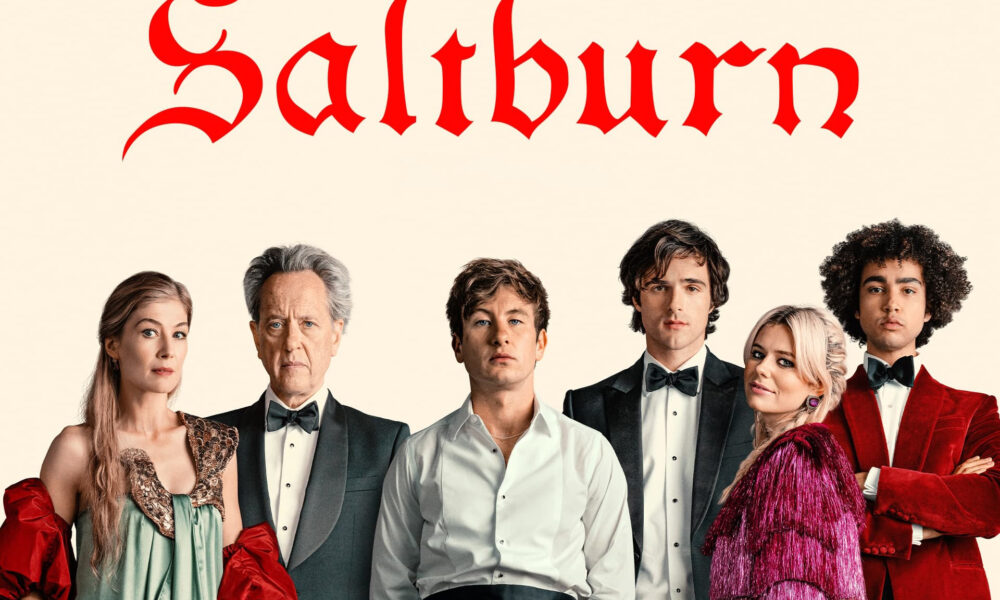Spoilers for Saltburn
Opulence. Drugs. Midnight strolls. A hedge maze. Far too many shots of bathtubs. Welcome to Saltburn, Emerald Fennell’s latest cinematic endeavour. Known for her bold feature-length directorial debut, Promising Young Woman, Fennell’s newest film takes a more ironic journey, enlisting a stellar cast to portray an “eat the rich” satire filled with twists and turns at every corner.
The film takes place in 2006 at Oxford University where scholarship student Oliver Quick (Barry Keoghan) struggles to assimilate with his privileged peers, whose legacies, family names, and substantial donations guarantee their admission. Oliver befriends popular and charismatic Felix Catton (Jacob Elordi), who appears sympathetic to his plight. Their friendship takes on an imbalanced, obsessive quality, blurring the boundaries between love and companionship. Stirred by compassion for Oliver’s familial struggles, Felix extends an invitation for him to spend the summer at his family’s lavish estate—Saltburn. Saltburn’s opulence initially overwhelms Oliver, yet even as he slowly embraces it, unease permeates the locale. The audience must immediately confront the discomfort of witnessing Oliver’s excessive indulgence and the intricate ways by which he inserts himself into the fabric of the Catton family. Saltburn, with its grandeur and intricate nuances, transforms into a microcosm of the subtle interplay between class, friendship, and personal identity.
The brilliantly performed satire skillfully dissects the themes of wealth and extravagance. Through Oliver’s eyes, Fennell peels back the mystique behind each character, gradually revealing the true nature of the individuals populating this world of riches. The cast truly elevates the film to its full potential, allowing for hilariously dark moments to enhance the film’s humour. Felix’s mom, Elsbeth Catton (Rosamund Pike), is electrifying in her cheerful cruelty; Pike’s line deliveries and incisive descriptions are a genuine delight, showcasing the amused detachment often associated with affluence. Moreover, Elordi flawlessly embodies the character of Felix, expertly toeing the line between the seemingly unattainably affluent youth and the grounded, relatable best friend. The on-screen chemistry between Elordi and Keoghan is undeniably compelling, adding a gripping dimension to their characters’ dynamic.
Fennell adeptly navigates the delicate task of presenting visually uncomfortable scenes while blending cinematography, colour palettes, and sound design to enhance the overall narrative impact. Several scenes leave the viewer grappling with conflicting emotions through an interplay of repulsion and self-reflection. Moreover, the cinematography and framing are expertly done. The film was shot in an unusual 1.33:1 aspect ratio, giving the viewer the impression that one is seeing more than they are meant to. This fosters a sense of intrigue, prompting the audience to engage more deeply with the visual nuances of the story—as if one is living in Saltburn with Oliver. Complementing this visual prowess, the soundtrack impeccably aligns with the narrative, serving as an auditory guide to the characters’ emotions and enhancing the overall cinematic experience.
The film carefully weaves its narrative tapestry to build anticipation and tension, but unfortunately, the conclusion falls short in terms of narrative coherence and a well-structured plot. Despite the film’s earlier success in building suspense, the concluding scenes diminish the overall impact of the storytelling. The resolution dissipates the heightened intrigue surrounding the main characters, culminating in an ultimately predictable ending. Nevertheless, Barry Keoghan’s performance remains effortlessly captivating until the closing credits. His methodical character exploration prompts the viewer to reflect on the broader implications of extravagance and privilege in contemporary society. In this way, the film succeeds in sparking contemplation that transcends its narrative shortcomings. Ultimately, Saltburn leaves a lasting impression by masterfully blending together visual and auditory elements, providing an immersive experience that transcends the boundaries of conventional storytelling.
‘Saltburn’ is now playing in theatres.









